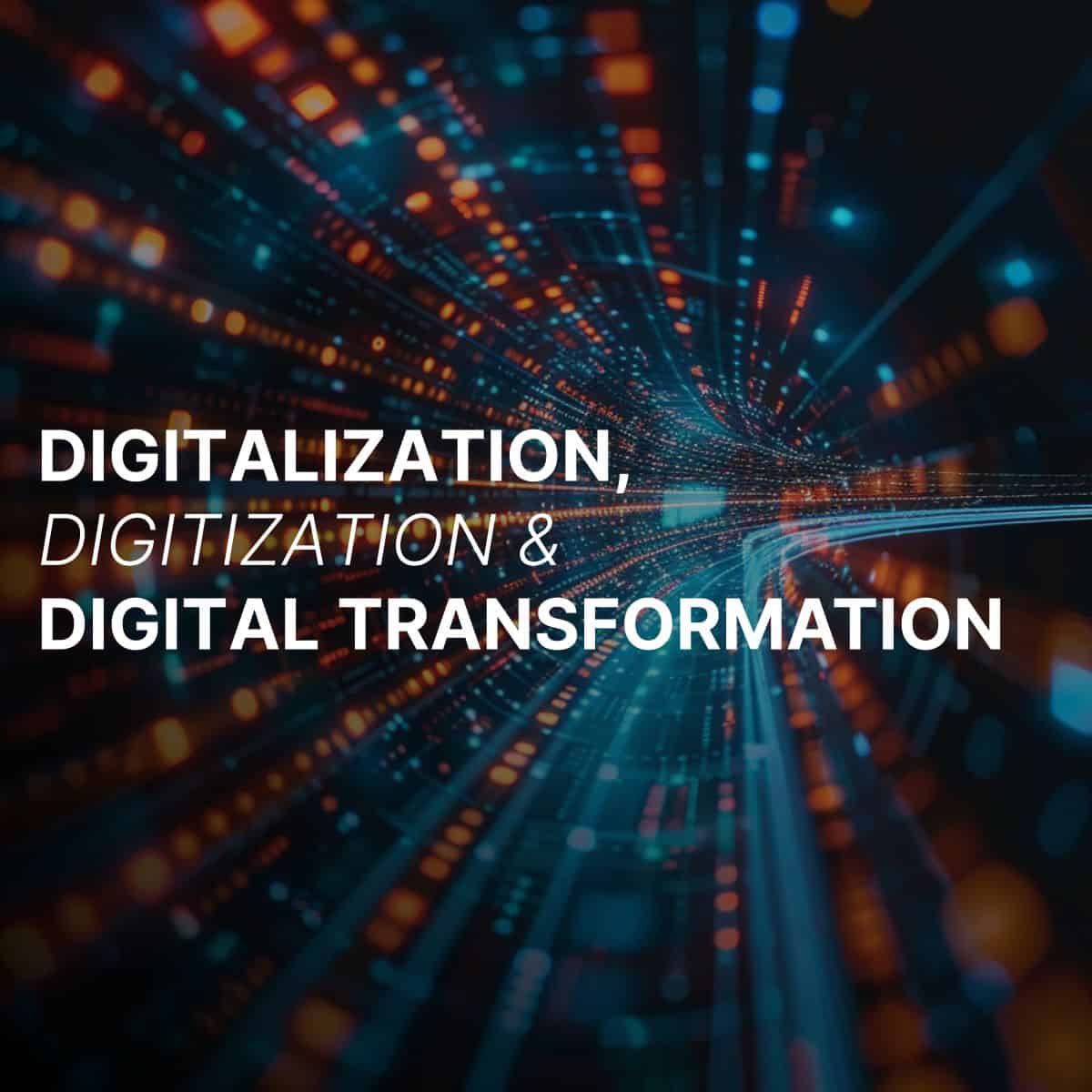Digitization, digitalization, and digital transformation are business processes that are often used interchangeably, yet they have distinct meanings and implications. This article will demystify these concepts, providing clear definitions, examples, benefits, and risks associated with each, along with a comparison to highlight their unique roles in the digital landscape.
What is Digitization?
Digitization refers to converting information from a physical format into a digital one, and it is often the first step in many organizations’ digital journey.
Examples of Digitization
- Scanning paper documents into digital files
- Converting analog audio recordings to digital formats
- Transforming handwritten notes into typed text using OCR (Optical Character Recognition) software
Benefits of Digitization
- Increased Accessibility: Connect to digital filed from anywhere, anytime.
- Space Saving: Reduces the need for physical storage space.
- Improved Efficiency: It is easier to search and retrieve digital information.
Risks Associated with Digitization
- Data Loss: Risk of losing data if not adequately backed up.
- Security Vulnerabilities: Digital data can be susceptible to cyber-attacks.
- Initial Costs: Expenses related to converting and storing data digitally.
What is Digitalization?
Digitalization goes beyond digitization and involves using digital technologies to effect change in a business model to provide new revenue and value-producing opportunities. It is the process of leveraging digitized information to improve business operations.
Examples of Digitalization
- Implementing Customer Relationship Management (CRM) systems
- Using digital tools for project management
- Automating customer service with chatbots
Benefits of Digitalization
- Enhanced Efficiency: Streamlines operations and reduces manual workload.
- Data-Driven Decisions: Enables better decision-making based on accurate data analysis.
- Improved Customer Experience: Provides more personalized and timely interactions.
Risks Associated with Digitalization
- Technology Dependence: Over-reliance on technology can be risky.
- Integration Challenges: Difficulties in integrating new digital systems with existing ones.
- Training Needs: Requires training employees to use new systems effectively.
What is Digital Transformation?
Digital Transformation is an enterprise approach that involves fundamental changes in an organization’s operations, culture, and customer value delivery. It integrates digital technologies into all business areas.
Examples of Digital Transformation
- Overhauling a company’s IT infrastructure
- Developing a digital-first business strategy
- Creating new digital products and services
Benefits of Digital Transformation
- Competitive Edge: Keeps the business relevant in a rapidly changing market.
- Innovation: Fosters a culture of continuous improvement with a focus on scalability
- Customer Satisfaction: Enhances customer satisfaction through better services and products.
Risks Associated with Digital Transformation
- High Costs: Significant financial investment is required.
- Cultural Resistance: Resistance from employees to adopt new ways of working.
- Implementation Complexity: Complex and time-consuming to implement.
Comparison of Digitization, Digitalization, and Digital Transformation
| Aspect | Digitization | Digitalization | Digital Transformation |
| Definition | Converting analog to digital | Using digital technologies to enhance business processes | Integrating digital technologies into all aspects of a business |
| Scope | Limited to data conversion | Broader, affecting business processes | Holistic, encompassing entire business model and culture |
| Impact | Improves accessibility and storage | Enhances efficiency and decision-making | Fundamental change in operations and strategy |
| Examples | Scanning documents | Implementing CRM systems | Overhauling IT infrastructure |
Benefits of Digitization, Digitalization, and Digital Transformation
Efficiency and Productivity
All three processes can significantly enhance efficiency and productivity by automating tasks, reducing manual work, and streamlining operations.
Cost Reduction
Digitization reduces physical storage costs and decreases manual processing expenses, and digital transformation can lead to overall operational cost savings.
Improved Customer Experience
Digitalization and digital transformation, in particular, offer ways to enhance customer experience through personalized services and faster response times.
Competitive Advantage
Organizations can stay ahead of the curve, leveraging new technologies to outpace competitors.
Risks of Digitization, Digitalization, and Digital Transformation
Security Concerns
All three processes involve handling digital data, which can be vulnerable to cyber threats if not adequately protected.
High Implementation Costs
While digitization might have lower initial costs, digitalization, and digital transformation can require significant investment in technology and training.
Resistance to Change
Employees may resist changes brought about by digitalization and digital transformation, affecting the successful implementation of these processes.
Dependence on Technology
Over-reliance on digital systems can pose risks if there are technical failures or cyber-attacks.
Mock Examples to Help Differentiate
Example 1: Digitization
A medical records office digitized patient files, making accessing and sharing information more accessible, reducing paper use, and improving efficiency.
Example 2: Digitalization
A retail company implemented a CRM system, which enhanced customer relationship management, streamlined sales processes, and improved customer satisfaction.
Example 3: Digital Transformation
A traditional media company transformed its business model by shifting to a digital-first strategy, launching new digital products, and optimizing digital marketing efforts, leading to increased market share and revenue growth.
The Future of Digitalization, Digitization, and Digital Transformation
Emerging Trends
- AI and Machine Learning: These technologies will play a significant role in all three processes, offering advanced data analysis, automation, and personalization.
- IoT (Internet of Things): Connected devices will drive digital transformation by providing real-time data and insights.
- Blockchain: Promises enhanced security and transparency in digital processes.
Predictions for the Next Decade
- Businesses will continue to integrate more sophisticated digital technologies.
- There will be a greater focus on cybersecurity to protect digital assets.
- Digital transformation will become a standard practice, not a competitive advantage.
Wrapping Up
Understanding the differences between digitization, digitalization, and digital transformation is essential for any organization aiming to thrive in the digital age. Each process offers unique benefits and comes with its own set of challenges. Businesses can enhance efficiency, improve customer experience, and maintain a competitive edge by strategically implementing these digital strategies.
FAQs
What is the difference between digitization and digitalization?
Digitization is converting analog information into digital form, while digitalization involves using digital technologies to improve business processes.
How does digital transformation impact businesses?
Digital transformation fundamentally changes business operations, culture, and customer value delivery, leading to innovation and a competitive edge.
What are the common challenges in digital transformation?
Common challenges include high implementation costs, resistance to change, and the complexity of integrating new technologies with existing systems.
Can small businesses benefit from digitalization?
Yes, they can streamline operations, improve customer interactions, and make data-driven decisions.
What industries are most affected by digital transformation?
Digital transformation significantly impacts retail, healthcare, finance, and media, though it is relevant across all sectors.
Supporting Digital Transformation at Unosquare
For the past 15 years, Unosquare has been leading the charge in supporting digital transformations for enterprises and small businesses.
Our deep expertise and dedication have enabled countless organizations to embrace the digital age, driving efficiency, innovation, and competitive advantage. Whether you’re looking to digitize your documents, enhance your business processes through digitalization, or embark on a comprehensive digital transformation journey, we have the experience and solutions to help you succeed.
Check out our blog for more insights, tips, and success stories. Stay informed and get inspired by the latest trends and best practices in digital transformation. Thank you for trusting Unosquare as your partner in this ever-evolving digital landscape.



